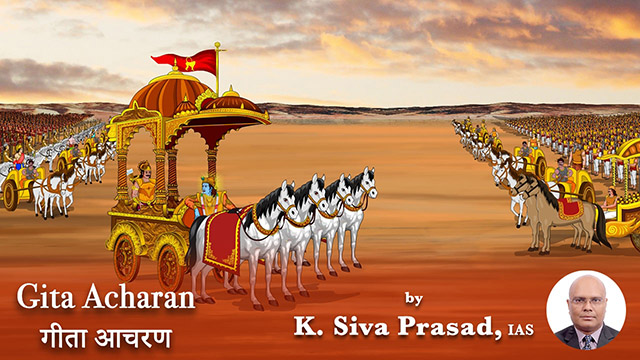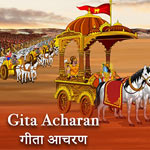
The Bhagavad Gita was a live conversation where Krishna was observing Arjun in totality. Krishna must have observed an expression of doubt or disbelief on Arjun's face when Krishna mentioned 'to remember HIM all the times and fight' (8.7) as Arjun was resisting the 'work at hand' (Kurukshetra battle). This tendency of resistance to the work at hand is still prevalent.
Krishna immediately describes HIMself as the Omnipresent, Eternal, the Great Ruler, Subtler than the finest atom, Supporter of all, of inconceivable form, Shines like the sun, beyond darkness (8.9). When existence has to describe itself even words fall short.
Krishna gives two paths to remember HIM. One is the path of awareness and says, "He attains the Supreme Effulgent Lord whose mind, stabilized by yoga, is immovably fixed on the thought of Him" (8.8).
The mind is evolved to divide the sensations brought by senses and this division is the birthplace of polarities of pleasure and pain (2.14). Though useful for physical survival or animalistic living, this ability needs to be kept under control. Krishna suggests the path of awareness i.e. yoga of equanimity to attain this state.
The second path is a technique based on devotion. Krishna says, "One who, at the time of death, fixes his 𝙥𝙧𝙖𝙣𝙖 (life breath) between the eyebrows and in full 𝙗𝙝𝙖𝙠𝙩𝙮𝙖 (devotion) engages himself in remembering the Supreme Lord, will certainly attain HIM" (8.10). Though this path appears easier than the first path of controlling the ever wandering mind, devotion or 𝙗𝙝𝙖𝙠𝙩𝙞 is the prerequisite for it.
𝘽𝙝𝙖𝙠𝙩𝙞 and 𝙎𝙝𝙧𝙖𝙙𝙙𝙝𝙖 are the common threads in the Gita. 𝘽𝙝𝙖𝙠𝙩𝙞 is unconditional love flowing from our hearts irrespective of outer conditions like the fragrance of a flower. 𝙎𝙝𝙧𝙖𝙙𝙙𝙝𝙖 is accepting anything coming our way as the blessings of the 𝙥𝙖𝙧𝙖𝙢𝙖𝙩𝙢𝙖 without any resistance.

